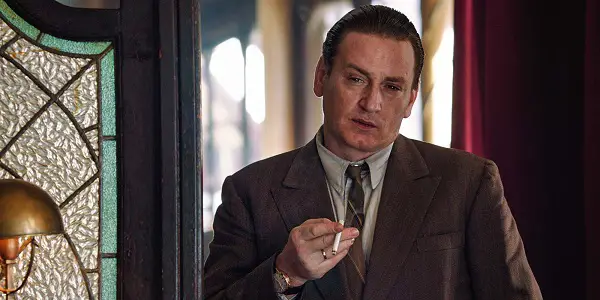MEMOIR OF WAR: The Agony Of Endless Waiting

Lee Jutton has directed short films starring a killer toaster,…
Published in 1985, La Douleur (War: A Memoir) is a semi-autobiographical novel by Marguerite Duras that is supposedly adapted from the diaries she wrote during the Nazi occupation of France in World War II – if those diaries actually existed. The book combines fiction and nonfiction to convey the complex effects war has on individual identity. Sounds difficult to adapt into a film, right? Yet that is what writer-director Emmanuel Finkiel has done with Memoir of War.
Starring Mélanie Thierry as Duras, the film is a gorgeous, expressionistic take on the war film that attempts to bring the unique style of the original text to life onscreen with mixed results.
Resistance and Collaboration
Marguerite’s husband, Robert Antelme, is a well-known author and French Resistance figure who is arrested by the Gestapo and deported to a concentration camp in 1944. Desperate for news of Robert’s condition and whereabouts, Marguerite embarks on an ambiguous and dangerous relationship with a French Nazi collaborator, Pierre Rabier (Benoît Magimel), who admires Marguerite as a writer and confides in her about his dream of opening an art bookshop after the war is over. (Naturally, in his version of events, the Germans win, even as rumors of their downfall grow stronger every day.)

Marguerite’s comrades in her Resistance cell are distrustful of Rabier and his intentions, especially Dionys Mascolo (Benjamin Biolay), with whom Marguerite has been secretly having an affair. Marguerite doesn’t trust Rabier either, and yet she keeps returning to him in an effort to get information out of him, all too aware that he likely expects to get information out of her in return.
Yet with the arrival of the Allies and the liberation of France, Marguerite discovers something even more terrible than this twisted cat-and-mouse game: the torture of seemingly endless waiting as the prisoners slowly return home, not knowing whether or not Robert will be one of them.
Internal Battlegrounds
As the film begins, Marguerite is reminiscing in voiceover about the end of the war as depicted in her journals, which she swears she cannot remember writing – a storytelling device carried over from the original book. This immediately sets Marguerite up as an enigmatic and unreliable narrator as she launches into her tale. Indeed, throughout the film a second Marguerite can often be seen lurking in the shadows or watching her in the mirror, observing herself with a somewhat judgmental eye as though to say, “Are you sure it happened like that?”
It’s truly haunting imagery, made all the more so by witnessing Marguerite’s devastating descent into loneliness during that time. Cinematographer Alexis Kavyrchine shoots these scenes in a subtle style that, by treating this form of doubling as commonplace, only emphasizes the emotional impact.
During the liberation of France, Marguerite unravels completely, unable to eat or get out of bed until she receives word of Robert. She may not have been on the front lines of the war, but the slow agony of waiting becomes her own battle. At one point Dionys points out the irony of her extreme actions, noting that she has grown apart from her husband, especially during these months he has spent in custody. Marguerite’s first impulse is to slap him for daring to say this out loud, but deep down, one knows Dionys is right.
Despite being in love with another man, pining for Robert is the only thing that keeps Marguerite going through the final days of the war; she cannot abide living in a world where her husband is dead, even if that would make it easier for her to be with Dionys. It’s a complex emotional battleground to find oneself in, one that doesn’t lend itself easily to identifying heroes and villains, but it gives Memoir of War an authenticity that more cookie-cutter wartime romances lack.
It’s difficult to center an entire film around what is essentially inaction, with great swaths of the film’s two-hour running time focused on Marguerite’s intense melancholy over her inability to do anything. This might read well on the page, but it’s difficult to translate to the screen without feeling bogged down in boredom. Fortunately, Thierry’s marvelous performance makes even the most mundane scenes feel emotionally propulsive. She has a face meant for extreme close-ups, a silent film throwback that can convey so much with just the flick of a cigarette.

Yet even Thierry’s magnetic presence can’t keep Memoir of War from dragging as it approaches the end. Perhaps the film strove to make the audience feel as impatient as Marguerite herself. If that was the case, then it did indeed succeed — but a great final act it does not make.
Memoir Of War: Conclusion
Memoir of War is at its best when it focuses on the complex inner life of its compelling protagonist, but even she can’t prevent this film from feeling unnecessarily drawn-out by the time it reaches its conclusion.
What do you think? Does Memoir of War sound like a worthy addition to the ever-expanding canon of World War II films? Share your thoughts in the comments below.
Memoir of War was released in the U.S. on August 17, 2018. You can find more international release dates here.
Does content like this matter to you?
Become a Member and support film journalism. Unlock access to all of Film Inquiry`s great articles. Join a community of like-minded readers who are passionate about cinema - get access to our private members Network, give back to independent filmmakers, and more.
Lee Jutton has directed short films starring a killer toaster, a killer Christmas tree, and a not-killer leopard. Her writing has appeared in publications such as Film School Rejects, Bitch: A Feminist Response to Pop Culture, Bitch Flicks, TV Fanatic, and Just Press Play. When not watching, making, or writing about films, she can usually be found on Twitter obsessing over soccer, BTS, and her cat.













